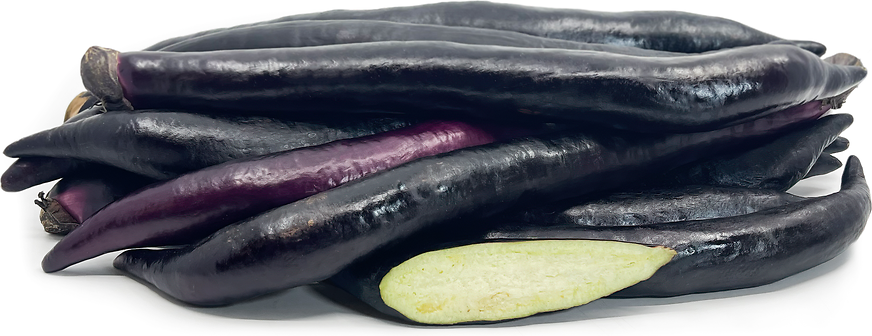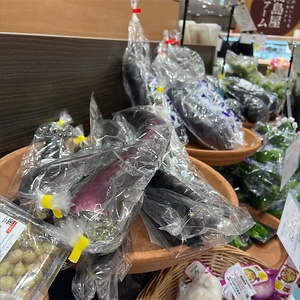


Fengyuan Eggplant
Estimated Inventory, lb : 0
Description/Taste
Fengyuan eggplants are elongated, averaging 25 to 45 centimeters in length, and have a slender, cylindrical shape. Each eggplant may be straight to slightly curved with tapered, slightly pointed ends, and is topped with a dark purple, thornless cap, also known as the calyx, on the stem end. The skin is thin, does not need to be peeled, and has a smooth, taut, and glossy appearance. Fengyuan eggplants typically appear in shades of saturated purple to dark purple, almost black. Underneath the surface, the white to ivory flesh is semi-firm, slightly spongy, and springy, enveloping a few tiny seeds. The flesh becomes dense, meaty, tender, and succulent when cooked. Fengyuan eggplants should be cooked before consumption. The variety has a mild and sweet taste without any bitterness that may be associated with other eggplant cultivars.
Seasons/Availability
Fengyuan eggplants are available year-round, with a peak season from summer through fall.
Current Facts
Fengyuan eggplant, botanically classified as Solanum melongena, is a Taiwanese variety belonging to the Solanaceae or nightshade family. The heirloom cultivar was once a well-known eggplant sold in fresh markets for its high yields, sweet taste, and long nature. In Taiwan, eggplant cultivation was historically divided between processing and fresh sales. Fengyuan eggplants are grown for fresh purposes and are considered an old variety in Taiwanese markets. It is important to note that Fengyuan eggplant was popular in the late 20th century but has since been replaced by improved modern cultivars like Pingtung Long and Mochi Long eggplant. Fengyuan eggplants are still grown on a small scale throughout Taiwan and are categorized as a rare, local cultivar. Fengyuan eggplants were also introduced worldwide and are sold through European and North American seed catalogs as a distinct home garden cultivar. Fengyuan eggplants are novel for their length and are planted as a culinary crop for savory culinary preparations.
Nutritional Value
Fengyuan eggplants have not been studied for their nutritional properties. Long, purple eggplant, in general, is a source of fiber to aid digestion and vitamins C, B, and K to strengthen the immune system, aid in faster wound healing, and contribute to energy production. Purple eggplants also provide anthocyanins, organic compounds with antioxidant properties that reduce inflammation and protect overall bodily health. Anthocyanins also contribute to the eggplant’s signature purple coloring. Beyond vitamins, purple eggplants contain minerals like potassium, manganese, and copper. In Traditional Chinese Medicine, eggplants are a cooling ingredient believed to clear heat from the body, improve circulation, and lessen swelling. These traits are ideal during the warm, humid summer months when eggplants are in peak season to help the body recover from hot conditions.
Applications
Fengyuan eggplants have a mild, sweet taste suited for cooked preparations. The elongated eggplants are known for having thin skin, allowing them to cook faster than other eggplant types. Fengyuan eggplants can be used in any preparation calling for long eggplant cultivars or recipes for Chinese eggplant. In Taiwan, most long-eggplant types are prevalently used in stir-fries. The eggplants are cooked with aromatics for enhanced flavoring and are served as a standalone dish or accompaniment to meat and vegetable main dishes. Fengyuan eggplants are also simmered into soups, stews, and curries or added to rice porridge. In addition to boiling and stir-frying, Fengyuan eggplant is occasionally steamed, pan-fried, or braised and mixed into rice dishes, tossed with minced meat, or sliced and fried. Fengyuan eggplants pair well with flavorings like green onions, garlic, ginger, and chile peppers, sauces such as soy, oyster, and sesame, herbs including cilantro and basil, and meats like beef, pork, and poultry. Whole, unwashed Fengyuan eggplants will keep for one week when stored wrapped in a paper towel and placed in an open bag in the refrigerator. Eggplants can also be kept for a few days at room temperature in a cool and dry location.
Ethnic/Cultural Info
Eggplants are a symbolic food eaten during the Dragon Boat Festival among Hakka communities in Taiwan. The Dragon Boat Festival is an annual celebration held on the fifth day of the fifth lunar month each year, typically occurring in late May or early June. The festival is a time of remembrance, mainly surrounding the famous poet Qu Yuan, and also features practices, events, and customs to help ward off evil spirits and bad luck. The sticky rice dumplings known as zhongzi are the most well-known items served during the Dragon Boat Festival, but eggplant is also cooked with green beans as a symbolic dish. Eggplant is believed to promote longevity, health, and blessings. Some families even say eating eggplants during the festival will help reduce mosquito bites. It is unknown when eggplant became a favored dish for the Dragon Boat Festival, but it is an ingredient primarily reserved for noon meals, as this is the time of day when energy is at its peak and can help cleanse the body and protect against spirits. Eggplants are also consumed to aid digestion, clear heat from the body, and balance the heaviness of the festival’s foods, especially the sticky rice dumplings.
Geography/History
Fengyuan eggplant is native to Taiwan. Eggplants were introduced to Taiwan from China and were commercially cultivated as a culinary crop. Much of the history of Fengyuan eggplants is unknown, but the variety is thought to be an heirloom that predates the late 20th century. Fengyuan eggplants were believed to have been created in the Fengyuan district in north-central Taiwan and were once known for being cultivated by remote villages that cultivated long types of eggplant. The variety was grown, picked, sorted, and packed by the villagers by hand, and it was shipped throughout Taiwan as a specialty cultivar. Not much has been recorded about the variety’s presence in cultivation, but there are some records noting that in the 1980s, it was one of five varieties that survived in Taiwanese markets when exports were being blocked, and cultivars were being abandoned. Today, Fengyuan eggplants are rare in Taiwan and are overshadowed by modern long cultivars. The variety is sold as a seasonal delicacy in its growing regions. Outside of Taiwan, Fengyuan eggplants are promoted through seed catalogs in Europe and the United States for their length, flavor, and thin skin. The variety may be found in farmers’ markets and wholesalers worldwide.
Recipe Ideas
Recipes that include Fengyuan Eggplant. One
| Veggie Belly |
|
Spicy Szechuan Eggplant with Tofu |
| Steamy Kitchen |
|
Stuffed Miso Eggplant |









